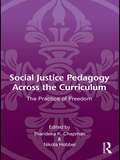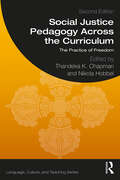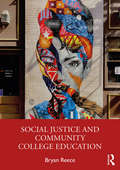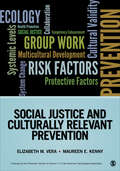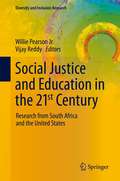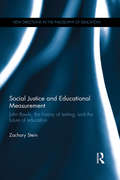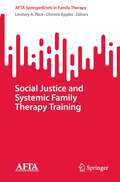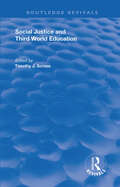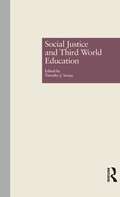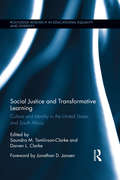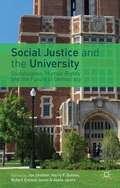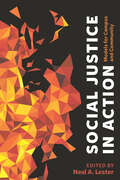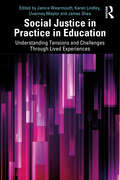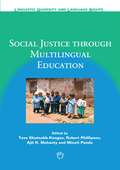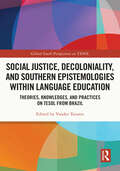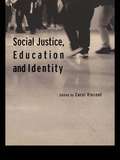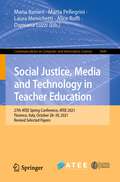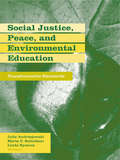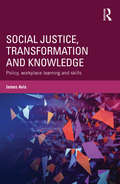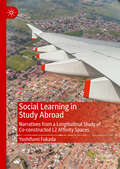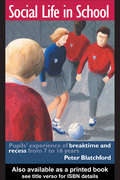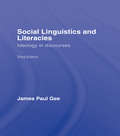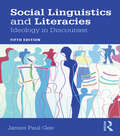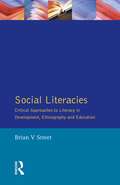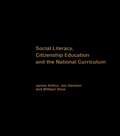- Table View
- List View
Social Justice Pedagogy Across the Curriculum: The Practice of Freedom
by Thandeka K. Chapman Nikola HobbelWhat knowledge and tools do pre- and in-service educators need to teach for and about social justice across the curriculum in K-12 classrooms? This compelling text synthesizes in one volume historical foundations, philosophic/theoretical conceptualizations, and applications of social justice education in public school classrooms. Part one details the history of the multicultural movement and the instantiation of public schooling as a social justice project. Part two connects theoretical frameworks to social justice curricula. Parts I and II are general to all K-12 classrooms. Part three provides powerful specific subject-area examples of good practice, including English as a Second Language and Special/ Exceptional Education Social Justice Pedagogy Across the Curriculum includes highlighted 'Points of Inquiry' and 'Points of Praxi's sections offering recommendations to teachers and researchers and activities, resources, and suggested readings. These features invite teachers at all stages of their careers to reflect on the role of social justice in education, particularly as it relates to their particular classrooms, schools, and communities. Relevant for any course that addresses history, theory, or practice of multicultural/social justice education, this text is ideal for classes that are not subject-level specific and serve a host of students from various backgrounds.
Social Justice Pedagogy Across the Curriculum: The Practice of Freedom (Language, Culture, and Teaching Series)
by Thandeka K. ChapmanHow can we continue to support educators who wish to design and facilitate social justice classrooms? What knowledge and tools do pre- and in-service educators need to teach about (in)equity, (in)justice, resilience, and agency across the curriculum in K–12 classrooms? The new edition of this compelling text synthesizes in one volume historical foundations, philosophic/theoretical conceptualizations, and applications of social justice education in public school classrooms. ● Part I details the history of the multicultural movement and the instantiation of public schooling as a social justice project. ● Part II connects theoretical frameworks to social justice curricula. Parts I and II are general to all K–12 classrooms. ● Part III provides powerful specific subject-area examples of good practice, including Multilingualism and Ethnic Studies. Social Justice Pedagogy Across the Curriculum, Second Edition includes highlighted Points of Inquiry and Points of Praxis sections that offer recommendations to teachers and researchers, and activities, resources, and suggested readings. These features invite teachers at all stages of their careers to reflect on the role of social justice in education, particularly as it relates to their particular classrooms, schools, and communities. Relevant for any course that addresses history, theory, or practice of multicultural/social justice education and teaching diverse groups of students, this text is essential reading for future and practicing teachers to understand and create resources for transformative, rigorous, and inclusive learning environments that support students from a range of backgrounds.
Social Justice and Community College Education
by Bryan ReeceThis book explores the central role community colleges play in American social justice. The United States has long-standing social and cultural structures that perpetuate inequality along race, ethnicity, and income lines. The primary role of American community colleges is to disrupt these structures on behalf of the students we serve. In this sense, community colleges are called to play a subversive role in contemporary society, but it is a good kind of subversion. Social Justice and Community College Education makes four very important contributions to this conversation: First, the book helps us quantify and understand the size and dimension of the equity gaps in higher education by tracking ten specific student groups from historically underserved communities. Second, the book summarizes best practices research and literature with regard to pedagogy, services, programs, and leadership in community colleges, presenting practical strategies for implementation. Third, through a national survey of community college personnel, the book covers significant new territory in the discussion of work we need to do collaboratively as community colleges. Fourth, this book captures the unique and special mission of American community colleges. Our work is the work of social justice, and we carry this work out in society at a greater volume, with greater intentionality, and through greater expertise than any other sector of higher education. In this arena, community colleges should lead.
Social Justice and Culturally Relevant Prevention (Prevention Practice Kit)
by Vera, Elizabeth M. and Kenny, Maureen E.This third book in the Prevention Practice Kit introduces the topics of social justice and cultural relevance in prevention practice—and increasingly important trend in the 21st century. Covering a wide range of research in this field, the authors skillfully help the readers understand, design, and implement social justice-driven, culturally relevant prevention efforts.The book presents concrete examples of programs that attempt to address issues of social injustice and cultural relevance. These examples are based on the authors′ real world experiences engaging in culturally responsive prevention guided by a social justice agenda. The reader will have opportunities for conversation about some of the more challenging aspects of infusing social justice and cultural relevance into one′s prevention efforts, and includes a series of learning exercises to promote these conversations.This book is part of the Prevention Practice Kit: Action Guides for Mental Health, a collection of eight books each authored by scholars in the specific field of prevention and edited by Dr. Robert K. Conyne and Dr. Arthur M. Horne. The books in the collection conform to the editors′ outline to promote a consistent reading experience. Designed to provide human services practitioners, counselors, psychologists, social workers, instructors, and students with concrete direction for spreading and improving the practice of prevention, the series provides thorough coverage of prevention application including a general overview of prevention, best practices, diversity and cultural relevance, psychoeducational groups, consultation, program development and evaluation, evidence base, and public policy.This book is endorsed by the Prevention Section of the Society of Counseling Psychology of the American Psychological Association. Fifty percent of all royalties are donated to Division 17 of the APA.
Social Justice and Education in the 21st Century: Research from South Africa and the United States (Diversity and Inclusion Research)
by Vijay Reddy Willie Pearson Jr.The world is not an equal place. There are high- and low-income countries and high- and low-income households. For each group, there are differential educational opportunities, leading to differential educational outcomes and differential labor market opportunities. This pattern often reproduces the privileges and inequalities of groups in a society. This book explores this differentiation in education from a social justice lens. Comparing the United States and South Africa, this book analyzes each country’s developmental thinking on education, from human capital and human rights approaches, in both primary and higher education. The enclosed contributions draw from different disciplines including legal studies, sociology, psychology, computer science and public policy.
Social Justice and Educational Measurement: John Rawls, the history of testing, and the future of education (New Directions in the Philosophy of Education)
by Zachary SteinSocial Justice and Educational Measurement addresses foundational concerns at the interface of standardized testing and social justice in American schools. Following John Rawls’s philosophical methods, Stein builds and justifies an ethical framework for guiding practices involving educational measurement. This framework demonstrates that educational measurement can both inhibit and ensure just educational arrangements. It also clarifies a principled distinction between efficiency-oriented testing and justice-oriented testing. Through analysis of several historical case studies that exemplify ethical issues related to testing, this book explores and propounds speculative design principles and arguments in favour of radically democratic school reforms, which address how the future of testing might be shaped to ensure justice for all. These case studies cover the widespread use of IQ-style testing in schools during the early decades of the 20th century; the founding of the Educational Testing Service; and the recent history of test-based accountability associated with No Child Left Behind. Social Justice and Educational Measurement will be essential reading for academics, researchers and postgraduate students in education, testing and assessment, and the philosophy of education. It will also be of interest to policymakers and educational administrators.
Social Justice and Systemic Family Therapy Training (AFTA SpringerBriefs in Family Therapy)
by Lindsey A. Nice Christie EpplerThe book examines the lived experiences of systemic family therapy educators. It addresses the issues of power and justice that they face in family therapy training programs, including their teaching experiences with students, interactions with faculty, and challenges within academic institutions. It describes how family therapy programs attempt to incorporate cultural awareness with mixed results (e.g., focusing only on how to work with diverse clients or not supporting faculty from across social locations). The book explores the ways in which family therapy educators with intersecting marginalized identities continue to be oppressed across different areas of academia.The book addresses issues of power that systemic family therapy educators face within the academia itself at three different levels:Personal interactions with students that create more complete understanding of issues of power.Professional interactions with colleagues that provide support and accountability.Political interventions aimed at changing the larger academic institution.Chapters focus on countering unjust practices in academic settings. Authors reflect on personal experiences across these three levels and, then, offer concrete suggestions for intervention. These include teaching experiences or meaningful interactions with students that support empowerment or increased awareness; relationships with colleagues that promote accountability and growth; and needed changes or challenges to the larger structure of academia.Social Justice and Systemic Family Therapy Training is an essential resource for clinicians, therapists, and practitioners as well as researchers, professors, and graduate students in family studies, clinical psychology, and public health as well as all interrelated disciplines.
Social Justice and Third World Education (Reference Books In International Education Ser. #37)
by Timothy J. ScraseFirst Published in 1997. In much of the comparative education literature, questions of educational inequality and lack of educational opportunity in the developing world stand as perplexing, complex, and difficult problems. Yet, while inequality in education remains one of the most researched and written about topics in the discipline, the question of social justice and its relationship to education remains implicit. This volume aims to reverse this trend・ to make the issue of social justice, both in theory and practice, central and explicit.
Social Justice and Third World Education (Reference Books in International Education #37)
by Timothy J. ScraseFirst Published in 1997. Routledge is an imprint of Taylor & Francis, an informa company.
Social Justice and Transformative Learning: Culture and Identity in the United States and South Africa (Routledge Research in Educational Equality and Diversity #6)
by Saundra M. Tomlinson-Clarke Darren L. ClarkeThe similarities between the United States and South Africa with respect to race, power, oppression and economic inequities are striking, and a better understanding of these parallels can provide educational gains for students and educators in both countries. Through shared experiences and perspectives, this volume presents scholarly work from U.S. and South African scholars that advance educational practice in support of social justice and transformative learning. It provides a comprehensive framework for developing transformational learning experiences that facilitates leadership for social justice, and a deeper understanding of the factors influencing personal, national and global identity.
Social Justice and the University
by Jon Shefner Harry F. Dahms Robert Emmet Jones Asafa JalataCan universities continue to play a major role in advancing social justice today? This volume illuminates key aspects of social justice as a theoretical project and as a set of practical challenges. Authors address related issues from the perspectives of active practitioners in the context of or from close proximity to universities.
Social Justice in Action: Models for Campus and Community
by Neal A. LesterAddressing both veterans of justice work and novices seeking points of entry, the essays in this volume showcase practical approaches to diversity, equity, and inclusion: ways to build community, earn trust, tell unheard stories, and develop solutions to problems. Emphasizing values such as empathy, self-reflection, and integrity, the volume is rooted in humanities work but also features contributions from fields as diverse as the performing arts, architecture, and evolutionary biology and represents settings beyond the college campus, such as schools, libraries, museums, and prisons. While bringing insights from higher education, it critiques the system as well, exploring the ways that institutions reinforce power structures and exclude marginalized voices. Interspersed with the essays, brief reflections by activists and artists offer testimony and inspiration.
Social Justice in Practice in Education: Understanding Tensions and Challenges Through Lived Experiences
by Janice Wearmouth James Shea Uvanney Maylor Karen LindleyExploring Social Justice in Practice in Education focuses on the tensions and challenges to issues of fairness and social and cognitive justice in the sphere of education. The terms ‘fairness’ and ‘social and cognitive justice’ are often used to justify particular policies and practices in the sphere of education. In providing a clear definition of what they should mean in practice, this book includes a discussion of, and, in some cases, potential resolutions to, tensions and challenges in relation to notions of fairness, and social and cognitive justice that are implicit within individuals’ lived experiences across all phases of education. Through their personal narratives, the authors illustrate how such tensions and challenges have played out in their own lives. They go on to explore differences in interpretations and consequent challenges in putting concepts of social justice into practice. Chapters consider important implications across different sectors and phases of education, including special educational needs, leadership and higher education. This insightful volume will enable educators, at all levels, to hear from students, family members, significant adults/carers and professionals, their experiences of fairness and social justice in education, and about what could be done in the future to redress injustices. It will appeal to readers at all levels in education including those studying for or teaching Education-related degrees at bachelors’, masters’ and doctoral levels.
Social Justice through Multilingual Education
by Robert Phillipson Tove Skutnabb-KangasThe principles for enabling children to become fully proficient multilinguals through schooling are well known. Even so, most indigenous/tribal, minority and marginalised children are not provided with appropriate mother-tongue-based multilingual education (MLE) that would enable them to succeed in school and society. In this book experts from around the world ask why this is, and show how it can be done. The book discusses general principles and challenges in depth and presents case studies from Canada and the USA, northern Europe, Peru, Africa, India, Nepal and elsewhere in Asia. Analysis by leading scholars in the field shows the importance of building on local experience. Sharing local solutions globally can lead to better theory, and to action for more social justice and equality through education.
Social Justice, Decoloniality, and Southern Epistemologies within Language Education: Theories, Knowledges, and Practices on TESOL from Brazil (Global South Perspectives on TESOL)
by Vander TavaresWith a strong focus on decoloniality and social justice, this volume brings together critical theories, concepts, and practices on TESOL from multiple Brazilian perspectives. The chapters showcase the work of teachers and teacher educators in confronting sociopolitical issues in Brazil, including in the domains of democracy, language education, and knowledge production, as well as prevailing issues within TESOL itself. Contributions stem from an eclectic range of analytical orientations that reflect ontological and epistemological diversity while demonstrating why, where, and how TESOL is done in Brazil. In doing so, this volume also establishes a place for Southern voices to be heard in the move toward challenging complex and long-standing issues of representation, marginalization, and exclusion that have traditionally characterised North-South relations in TESOL as a field. This volume seeks to promote Southern-based conversations about decoloniality and social justice in TESOL and will be of direct relevance to graduate students, researchers, and scholars in the field of TESOL and foreign language education.
Social Justice, Education and Identity
by Carol VincentThis book answers key questions regarding social justice in education. Its central theme is how the education system, through its organization and practices, is implicated in the realisation of just or unjust social outcomes. In particular, the writers examine the ways in which the identities of individuals and groups are formed and transformed in schools, colleges and universities.The book contains examples drawn from early years through to higher education. It has a dual focus, addressing:* theoretical debates in social justice, including how the concept of social justice can be understood, and theoretical issues around social capital, and class and gender reproduction* the formation of learner identities focusing on how these are differentiated by class, ethnicity, gender, sexuality and (dis)ability.Carol Vincent has assembled a wide-ranging collection of lucidly argued essays by a panel of internationally respected contributors. The authors draw on their current and recent research to inform their writing and so theory is balanced with extensive empirical evidence. Therefore the debates continued here have implications for policy and practice, as well as being theoretically and analytically rich.This book will provide unrivalled coverage of the subject for researchers, academics, practitioners and policymakers in education.
Social Justice, Media and Technology in Teacher Education: 27th ATEE Spring Conference, ATEE 2021, Florence, Italy, October 28–29, 2021, Revised Selected Papers (Communications in Computer and Information Science #1649)
by Maria Ranieri Marta Pellegrini Laura Menichetti Alice Roffi Damiana LuzziThis book constitutes the refereed proceedings of the 27th ATEE Spring Conference onSocial Justice, Media and Technology, ATEE 2021, held in Florence, Italy, during October 28–30, 2021.The 19 full papers included in this book were carefully reviewed and selected from 49 submissions. They were organized in topical sections as follows: teaching critical media/digital literacy in multicultural societies; decommodifying teacher (digital) education; and digital technology and equity for inclusive teaching.
Social Justice, Peace, and Environmental Education: Transformative Standards (Teaching/Learning Social Justice)
by Julie Andrzejewski Marta P. Baltodano Linda SymcoxThe concept of "standards" seems antithetical to the ways critical educators are dedicated to teaching, but what would "standards" look like if they were generated from social justice perspectives and through collaborative and inclusive processes? Such is the central question posed by the contributors of this groundbreaking collection on the interconnectivity of social justice, peace, and environmental preservation. Challenging education that promotes consumerism, careerism, and corporate profiteering, they boldly offer examples of a new paradigm for practicing a transformative critical pedagogy. Rather than just talking about coalition building within and across educational communities, they demonstrate how we might communicate from different vantage points and disciplinary boundaries to create a broader picture of social and eco-justice. Social Justice, Peace, and Environmental Education will be required reading for educators and students who want to envision and practice living, acting, and teaching for a better world.
Social Justice, Transformation and Knowledge: Policy, Workplace Learning and Skills
by James AvisSocial Justice, Transformation and Knowledge: Policy, Workplace Learning and Skills examines the policy contexts in which lifelong learning, vocational education and training and skill development is set. It provides a critique of neo-liberalism and its impact on vocational education and training and lifelong learning. It interrogates potentially progressive policy interventions that take for granted capitalist relations as these can become a form of ‘comfort radicalism’ that whilst calling for structural change remain lodged within capitalism. Such analyses are limited, particularly in austere conditions of worklessness with increasing numbers of workers surplus to the requirements of capital. Offering detailed discussions within UK, European and global contexts, this book proves an insightful and critical text which illustrates Professor Avis’ extensive experience and knowledge of the field. Adopting a substantive focus on debates and analysis with significance that extends beyond the particular policy context of England, the book offers: an exploration of arguments that suggest workplace learning carries with it progressive possibilities an examination of models of class implicit within education policy and documents consideration of forms of governance and professionalism and their articulation to the pursuit of social justice an insight into discussions concerned with social justice, knowledge as well as the current conditions of austerity in which education and social policy are emphasised Social Justice, Transformation and Knowledge is a significant addition to the field. It is an insightful and thought-provoking book from which students, lecturers and researchers with an interest in education studies, education policy, and social justice will greatly benefit from reading.
Social Learning in Study Abroad: Narratives from a Longitudinal Study of Co-constructed L2 Affinity Spaces
by Yoshifumi FukadaThis book explores how international students construct target language- (TL-) mediated social spaces for socializing. The author asks what factors either prevent or promote the construction of TL-mediated socializing opportunities by international students, how such students can grow both as TL learners/speakers/users and as people throughout their TL-mediated socializing, and how international students’ socializing, and their affective states during socializing, change across time during their stay in the host country. He analyses international students’ TL-mediated socializing and its co-construction primarily within the conceptual frameworks of situated learning (Lave & Wenger, 1991) and affinity space (Gee, 2004), with additional insights from peripheral/marginal participation (Wenger, 1998), scaffolding (Wood, Bruner, & Ross, 1976), identity (re-)construction (Norton, 2000), and Discourse (Gee, 2012). This book proposes concrete educational and pedagogical implications, based on the findings, which will be meaningful for both educational institutions and educators involved in study abroad programs or education. It will also be of interest to students and scholars in related academic fields including Applied Linguistics, Language Education, Sociolinguistics and Pragmatics.
Social Life in School: Pupils' experiences of breaktime and recess from 7 to 16 (Educational Change And Development Ser. #No. 7)
by Peter BlatchfordAre breaktimes really just a time of violence and bullying that could be better used for working? Based on a unique and fascinating longitudinal study of a group of pupils from primary to secondary school, the author of this timely new book proposes an alternative view. He believes that breaktime plays an important part in children's social development, and through his gathering of pupil's own views on breaktimes over a period of ten years, we see how breaktimes offer children time to play; to develop friendships; to build social networks; to develop social skills and competence; to be independent from adults; and to learn to manage conflict, aggression and inter-group relations. Where else will they learn these important skills if not in the playground? What will happen in a society where these skills are not developed?
Social Linguistics and Literacies: Ideology in Discourses (Critical Perspectives On Literacy And Education Ser.)
by James GeeThis fully-updated new edition engages with topics such as orality and literacy, the history of literacy, the uses and abuses of literacy in that history, the analysis of language as cultural communication, and social theories of mind and meaning, among many other topics. It represents the most current statement of a widely discussed and used theory about how language functions in society, a theory initially developed in the first edition of the book, and developed in this new edition in tandem with analytic techniques for the study of language and literacy in context, with special reference to cross-cultural issues in communities and schools. Built around a large number of specific examples, this new edition reflects current debates across the world about education and educational reform, the nature of language and communication, and the role of sociocultural diversity in schools and society. One of the core goals of this book, from its first edition on, has been to develop a new and more widely applicable vision of applied linguistics. It will be of interest to researchers, lecturers and students in education, linguistics, or any field that deals with language, especially in social or cultural terms.
Social Linguistics and Literacies: Ideology in Discourses (Critical Perspectives On Literacy And Education Ser.)
by James GeeIn its first edition, Social Linguistics and Literacies was a major contribution to the emerging interdisciplinary field of sociocultural approaches to language and literacy, and was one of the founding texts of the 'New Literacy Studies'. This book serves as a classic introduction to the study of language, learning and literacy in their social, cultural and political contexts. It shows how contemporary sociocultural approaches to language and literacy emerged and: Engages with topics such as orality and literacy, the history of literacy, the nature of discourse analysis and social theories of mind and meaning Explores how language functions in a society Surveys the notion of 'discourse' with specific reference to cross-cultural issues in communities and schools. This fifth edition offers an overview of the sociocultural approaches to language and literacy that coalesced into the New Literacy Studies. It also introduces readers to a particular style of analyzing language-in-use-in-society and develops a distinctive specific perspective on language and literacy centered on the notion of "Discourses". It will be of interest to researchers, lecturers and students in education, linguistics, or any field that deals with language, especially in social or cultural terms.
Social Literacies: Critical Approaches to Literacy in Development, Ethnography and Education (Real Language Series)
by Brian V. StreetSocial Literacies develops new and critical approaches to the understanding of literacy in an international perspective. It represents part of the current trend towards a broader consideration of literacy as social practices, and as its title suggests, it focuses on the social nature of reading and writing and the multiple character of literacy practices.
Social Literacy, Citizenship Education and the National Curriculum
by James Arthur Jon Davison William StowThis timely book looks at social literacy within the revised National Curriculum which places an obligation on schools and teachers to promote social cohesion, community involvement and a sense of social responsibility among young people.Social Literacy, Citizenship Education and the National Curriculum is an introduction to the social purposes and aims contained in the revised National Curriculum. It provides the theory behind the movement for social literacy as well as providing information for teachers, lecturers and policy makers on putting the government's ideas into practice.
